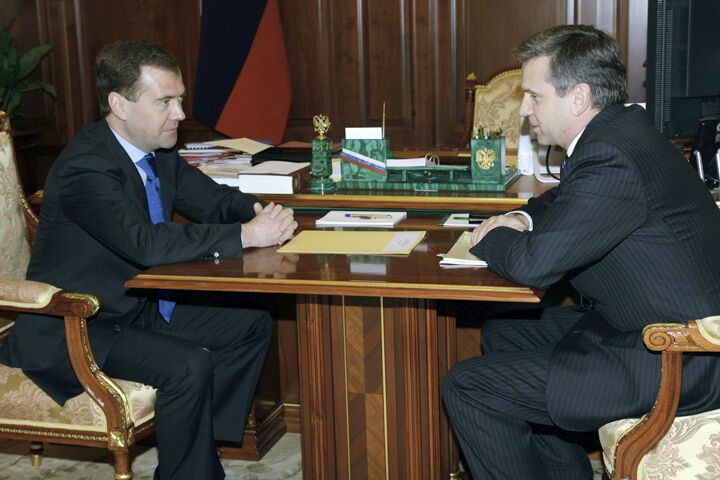
Russia Reins Back Former Soviet States
It’s been a good week for the Kremlin. First, Russia emerged as the only clear-cut winner from Sunday’s national election in Ukraine. Meanwhile, it appears the heretofore pro-West nation of Georgia is coming to terms with Russian preponderance, and is positioning itself for a future within the Russian fold.
As expected, former Ukrainian Prime Minister Viktor Yanukovich won the election with 35 percent of the vote. Prime Minister Yulia Tymoshenko came second, with 25 percent. But because neither candidate garnered more than 50 percent of the vote, Yanukovich and Tymoshenko must now compete in a runoff election on February 7. Experts say the race for president is wide open. Ultimately, the winner won’t much matter—we already know the real winner.
“Moscow, it seems, is the winner of the election so far,” noted Spiegel Online. Prior to the election, think tank Stratfor wrote, “Whichever of these candidates wins, Ukraine will return to the Russian fold after the presidential election. Moscow holds sway over each of these candidates, though in different ways” (January 15).
Even though the final winner of the election is yet to be decided, Russia has announced it will resume diplomatic ties with Ukraine, and send an ambassador. The message is clear: It is expecting Ukraine to begin cooperating more wholeheartedly.
Yanukovich owes his power and position to the Kremlin. Without Russia he is nothing, and therefore has no choice but to remain loyal. Tymoshenko seems loyal only to herself—switching between being pro- and anti-Russian. However, she can be bought. Stratfor reports that Russia will use business deals to ensure her cooperation. “Tymoshenko knows that Ukraine is turning back toward Russia and that if she does not join the pro-Russian movement she will be crushed by it,” Stratfor writes. “Russia knows she is not a true believer in the pro-Russian cause, like Yanukovich, but that if they make it worth her while she will support the Kremlin. A Tymoshenko presidency will bring Ukraine closer to Russia, but not because of any sense of loyalty to a political ideology” (ibid.). No wonder Russia is sure that it now controls the country.
Trumpet editor in chief Gerald Flurry forecast Ukraine’s return to Russia in August 2008. At the time, there was talk of Ukraine and Georgia joining nato. “I don’t believe Russia will ever allow that to happen,” he wrote. Ukraine “is the breadbasket of Russia, and surely it is willing to wage war over that as well.” Rather than launching a “hot” war, Russia has clearly been engaged in a campaign of intimidation, subversion and propaganda. And it seems to have worked. The more pro-European western part of Ukraine may still give the Kremlin some trouble, but the east (and the national government) is now firmly in Russia’s grasp.
Georgia is taking note. There, politicians can see Russia consolidating its power over its neighbors. With the change in Ukraine, and the new customs union between Russia, Belarus and Kazakhstan, Russia only has one more nation to bring to heel: Georgia.
Unwilling to face the enormous pressure Russia could bring to bear on this one errant nation, many in Georgia are not willing to risk another confrontation. They want to adopt a more pragmatic approach. For example, Stratfor reports that on January 18 Georgia’s Conservative Party called for “serious talks about the normalization of Russo-Georgian relations and even offered to drop Georgia’s nato ambitions as a step toward such normalization—the first time a Georgian party has seriously proposed giving up the idea of nato membership” (January 19).
“It appears that for the first time in years a political force is emerging in Georgia that is ready and willing to cooperate with the Kremlin,” writes Stratfor (ibid.).. The government is not listening—for now. But watch for Russia to back the pragmatic politicians in Georgia in a similar way to what it has done in Ukraine.
Georgia will not be the only nation taking note of Russia’s success in Ukraine. Its actions are a warning to all of Europe, and especially Germany.
“As Russia gets stronger, as the world grows more dangerous, as economic problems escalate, the Germans will be crying out for strong leadership!” Gerald Flurry wrote last year. “They are looking for a king—with a fierce enough countenance to stand up to Vladimir Putin!”
The world became a more dangerous place after Russia’s invasion of Georgia, but Russia isn’t the only nation we need to watch. Germany will react to the resurgence of Russia, creating an even more dangerous European power. For more information, see our article “Russia’s Attack Signals Dangerous New Era.”
